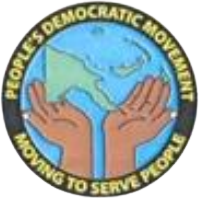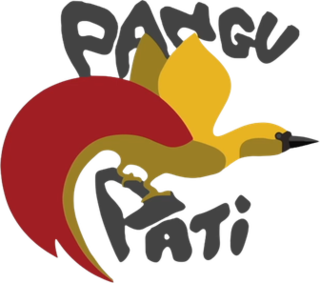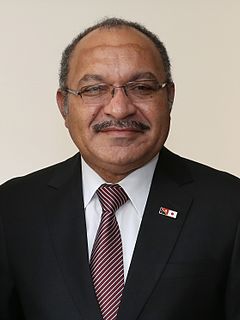
The politics of Papua New Guinea takes place in a framework of a parliamentary representative democratic multi-party system, whereby the prime minister is the head of government. Papua New Guinea is an independent Commonwealth realm, with the monarch serving as head of state and a governor-general, nominated by the National Parliament, serving as their representative. Executive power is exercised by the government. Legislative power is vested in both the government and parliament.

Sir Julius Chan served as Prime Minister of Papua New Guinea from 1980 to 1982 and from 1994 to 1997. He is Member of Parliament for New Ireland Province, having won the seat in the 2007 national election. He is also the current Governor of New Ireland Province, since 2007. On 26 May 2019, Prime Minister Peter O'Neill announced he would soon resign and that he wished for Sir Julius to succeed him. An outgoing Prime Minister does not, however, have the power to appoint his successor, and the following day O'Neill delayed his own formal resignation. He was also a leading figure in his country during the years-long Bougainville conflict.

The People's Democratic Movement is a political party in Papua New Guinea.

The Pangu Pati, also known as the Pangu Party or Papua and Niugini Union Pati, is a political party in Papua New Guinea. As of September 2019, the party had 23 of 111 seats in the National Parliament.

Paias Wingti is a Papua New Guinean politician. He served as the third Prime Minister of Papua New Guinea between 1985 and 1988, and again from 1992 to 1994.
The United Party is a political party in Papua New Guinea. As of May 2019, it has one seat in the National Parliament and is led by Minister for Foreign Affairs, Rimbink Pato.

The People's National Congress is a political party in Papua New Guinea. Its former leader Bill Skate served as Prime Minister from 1997 to 1999 and as speaker of Parliament from 2002 to 2004. Skate died in 2006 and the party is now led by Peter O'Neill. PNC originated from the National Capital District where former leader was the Governor of NCD and the Parliamentary Member. The party had 22 members in the 111-seat National Parliament of Papua New Guinea as of September 2019.

The National Parliament of Papua New Guinea is the unicameral national legislature in Papua New Guinea. It was created in 1964 as the House of Assembly of Papua and New Guinea but gained its current name after the nation was granted independence in 1975.

Bernard Mullu Narokobi OBE was a Papua New Guinean politician, jurist, and philosopher. He was serving as the Papua New Guinean High Commissioner to New Zealand prior to his death. Between 1987 and 1997 he represented his Wewak Open Electorate as a Member in the Papua New Guinea's National Parliament. During his time as a Member of Parliament (MP), he served as the Minister for Justice (1988–1992) in the government led by the then Prime Minister Rabbie Namaliu; Agriculture Minister (1992–1994) under the leadership of Prime Minister Sir Julius Chan led government; and Opposition Leader between 1998 and 2002, and Speaker of the National Parliament of Papua New Guinea, until he lost his seat to the then Wewak MP Kimson Kare during the 2002 elections. He was displaced as a minister in the Chan government for failing to vote in favour of constitutional reforms in the provincial system of government.

Don Pomb Polye is a Papua New Guinean politician from Enga Province. He has been a Cabinet Minister under two Prime Ministers, and was briefly Deputy Prime Minister from July to December 2010. He has held Foreign Affairs, Immigration, Transport, Civil Aviation, Finance and Treasury portfolios.

The United Resources Party is a political party in Papua New Guinea.
The New Generation Party is a political party in Papua New Guinea.

General elections were held in Papua New Guinea between 18 June and 9 July 1977, the first since independence from Australia in 1975. The Pangu Party led by Prime Minister Michael Somare emerged as the largest in the National Parliament. Somare subsequently formed a coalition government with the People's Progress Party (PPP) and several independent MPs. Voter turnout was 60.3%.

John Momis is a Bougainvillean politician who served as the President of the Autonomous Region of Bougainville in Papua New Guinea between 2010 and 2020.

Peter Charles Paire O'Neill is a Papua New Guinean politician who served as the seventh Prime Minister of Papua New Guinea from 2011 to 2019. From 2002 until the present he served as Member of Parliament for Ialibu-Pangia. He occupied several positions as a Cabinet minister before being elected as Prime Minister. He is the leader of the Papua New Guinea National Congress. Towards the end of his tenure, he avoided a vote of no confidence by resigning his position, and was succeeded by James Marape as prime minister. O’Neill won the Ialibu-Pangia seat in 2022 in the first round with a large majority. This is unusual in PNG politics.
Bartholomew "Bart" Philemon is a Papua New Guinean politician.
Sir John Pundari is a Papua New Guinean politician. He has been Speaker of the National Parliament (1997–1999), Deputy Prime Minister (1999), Minister for Foreign Affairs (2001), and currently serving as the Minister of Finance and Rural Development since 20 December 2020.
Iambakey Palma Okuk was an independence leader in Papua New Guinea and served as Deputy Prime Minister, the nation's first Minister for Agriculture and Fisheries, and repeatedly in the capacity of Minister of Transport, Minister of Primary Industries and Opposition Leader. He is known as Papua New Guinea's "most colourful and controversial politician". Okuk first led protests against unfair labor practices, and then once elected to office, worked to reserve sectors of the economy for citizens as a method of returning a complex economic role to Papua New Guineans. In the post-independence decade, Okuk built a coalition of minority political factions which forced a successful change of government, in which he became Deputy Prime Minister.

Papua Besena was a political party in Papua New Guinea.

General elections were held in Papua New Guinea from 4 to 22 July 2022 to elect the members of the National Parliament for a new five-year term.











